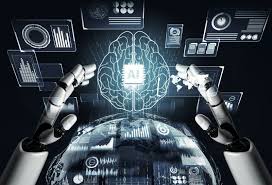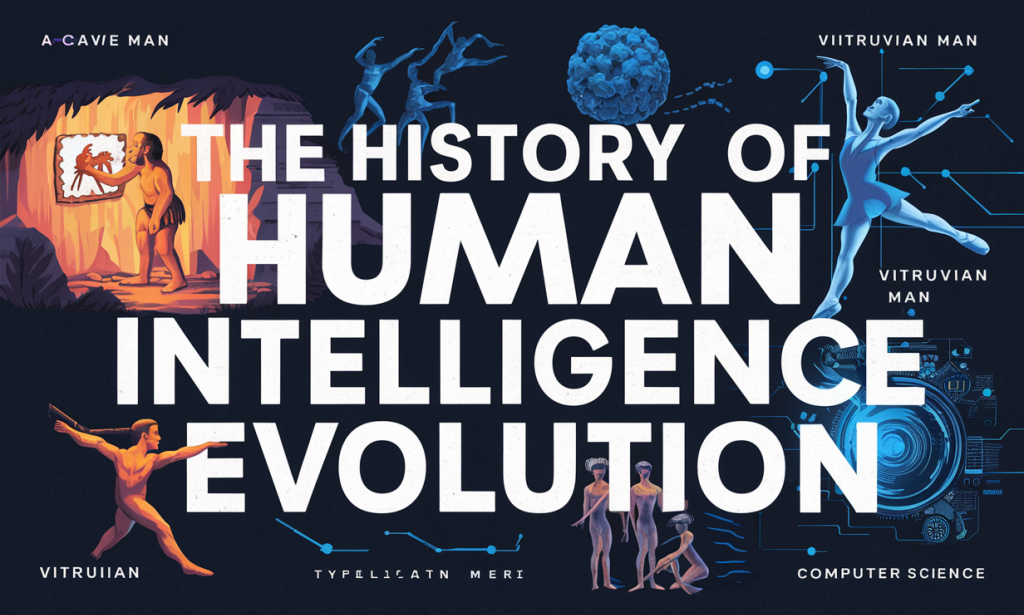The story of human intelligence is one of adaptation:
Survival, and remarkable innovation. Over millennia, humans have developed cognitive abilities that set us apart from other species, enabling us to understand and manipulate our environment, build civilizations, and transform the world around us. From the earliest toolmakers to modern scientists, the evolution of human intelligence reflects the intricate interplay of biology, environment, and culture.

Early Beginnings: The Dawn of Intelligence:
The origins of human intelligence can be traced back to our ancient ancestors in Africa. Approximately 2.5 million years ago, early hominins like Homo habilis began exhibiting rudimentary problem-solving skills. These ancestors created simple stone tools, marking a significant leap in cognitive ability. Tool-making required foresight, planning, and a basic understanding of cause and effect, laying the foundation for more advanced intelligence.
Another key milestone was the development of social structures. Living in groups provided safety and allowed for the sharing of resources and knowledge. Social interaction necessitated communication, paving the way for the evolution of language. Early forms of communication, such as gestures and vocalizations, helped coordinate activities like hunting and gathering, fostering cooperation and collective problem-solving.
The Role of Brain Development:
The human brain is a marvel of evolution. Compared to other primates, humans have disproportionately large brains, particularly in areas like the prefrontal cortex, which is responsible for reasoning, planning, and decision-making. This expansion, known as encephalization, began with species like Homo erectus and continued through to Homo sapiens.
The increase in brain size came with trade-offs. Larger brains required more energy, leading to changes in diet. Early humans began consuming more nutrient-rich foods, including meat, which supported brain development. Cooking, a uniquely human behavior, further enhanced nutrient absorption and allowed for the consumption of a broader range of foods.
Language: The Cognitive Revolution:
The emergence of language was a turning point in the evolution of human intelligence. While the exact timeline remains debated, many researchers believe that complex language began developing around 100,000 years ago. Language transformed the way humans interacted, enabling them to share knowledge, express abstract ideas, and pass down information across generations.
With language came storytelling and the ability to imagine scenarios beyond immediate reality. This allowed humans to plan for the future, create myths and cultural narratives, and develop sophisticated social systems. Language also facilitated the growth of trade, as humans could negotiate and establish agreements, further enhancing cooperation.

Agriculture and the Rise of Civilization:
The agricultural revolution, which began around 10,000 years ago, marked another leap in human intelligence. Transitioning from hunter-gatherer lifestyles to settled farming communities required new skills and ways of thinking. Humans learned to manipulate their environment, domesticate plants and animals, and develop tools for agriculture.
The surplus of food enabled population growth and the establishment of villages and cities. Complex societies emerged, demanding advancements in organization, governance, and technology. Writing systems developed to record transactions, laws, and knowledge, preserving information for future generations.
The Scientific and Industrial Revolutions:
As civilizations flourished, so did human intellect. The scientific revolution of the 16th and 17th centuries marked a period of groundbreaking discoveries. Thinkers like Galileo, Newton, and Kepler challenged traditional views and sought to understand the natural world through observation and experimentation.
The industrial revolution, beginning in the 18th century, further demonstrated human ingenuity. Advances in machinery, energy, and transportation transformed economies and societies. These periods of innovation underscored humanity's ability to solve complex problems and adapt to changing circumstances.
Intelligence in the Modern Era:
Today, human intelligence continues to evolve, shaped by technology and cultural shifts. The digital revolution has revolutionized how we access and share information. Computers, the internet, and artificial intelligence have expanded the boundaries of human cognition, allowing us to process and analyze data on an unprecedented scale.Technology also poses challenges. While it enhances productivity and connectivity, it raises questions about dependency and the potential erosion of critical thinking skills. As artificial intelligence becomes more integrated into daily life, the relationship between human and machine intelligence is an area of active exploration.

Biological and Environmental Influences:
The evolution of intelligence is not solely a result of biology. Environmental factors, such as climate changes, resource availability, and social dynamics, have also played a significant role. For instance, periods of climate instability may have driven early humans to innovate and adapt, fostering creativity and problem-solving.
Cultural evolution, including the development of education and institutions, has amplified human intelligence. Unlike biological evolution, which occurs over thousands of years, cultural evolution can happen rapidly, accelerating the spread of knowledge and ideas.
The Future of Human Intelligence:
As we look to the future, the trajectory of human intelligence raises intriguing possibilities. Advances in genetics and neuroscience may allow us to enhance cognitive abilities or better understand the brain’s inner workings. The integration of technology, such as brain-computer interfaces, could further augment human intelligence, blurring the lines between biology and machine.
At the same time, humanity faces challenges that demand collective intelligence, including climate change, global health crises, and ethical dilemmas posed by technological advancements. Solving these issues will require not only individual brilliance but also collaboration and empathy.
Conclusion:
The evolution of human intelligence is a testament to our species' adaptability and creativity. From the first toolmakers to the architects of modern technology, each step has built upon the achievements of those who came before. While the path of human intelligence has been shaped by biology, environment, and culture, its future will depend on our ability to innovate responsibly and address the complexities of an ever-changing world.As we continue this journey, the evolution of intelligence reminds us of our shared potential and the responsibility to use our cognitive gifts to build a better future for all.


You must be logged in to post a comment.